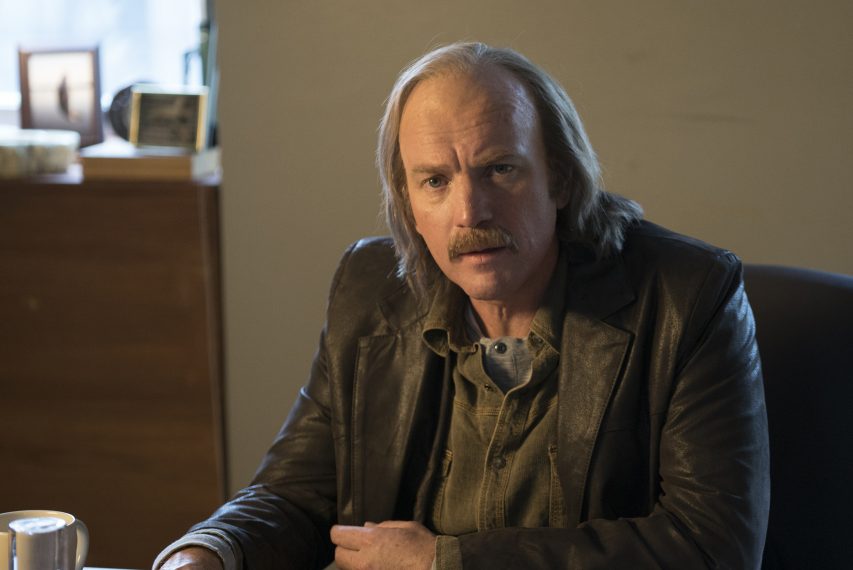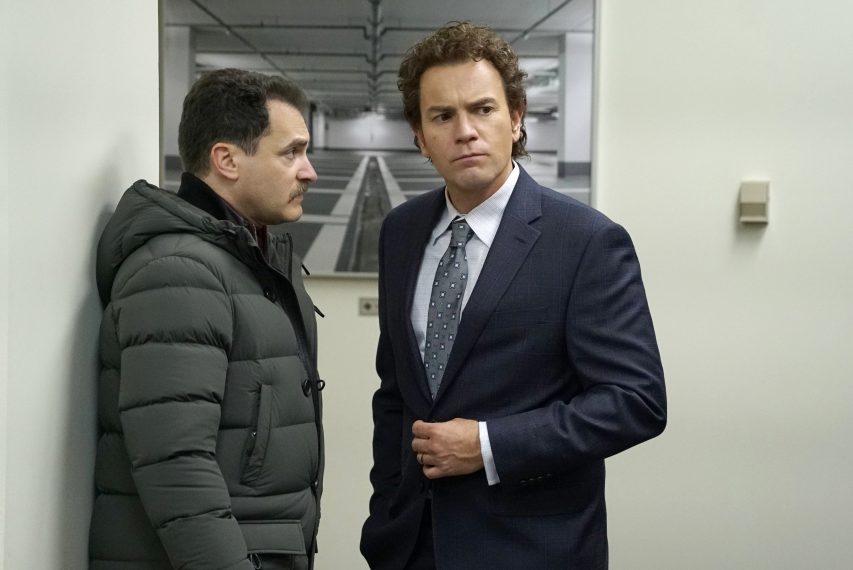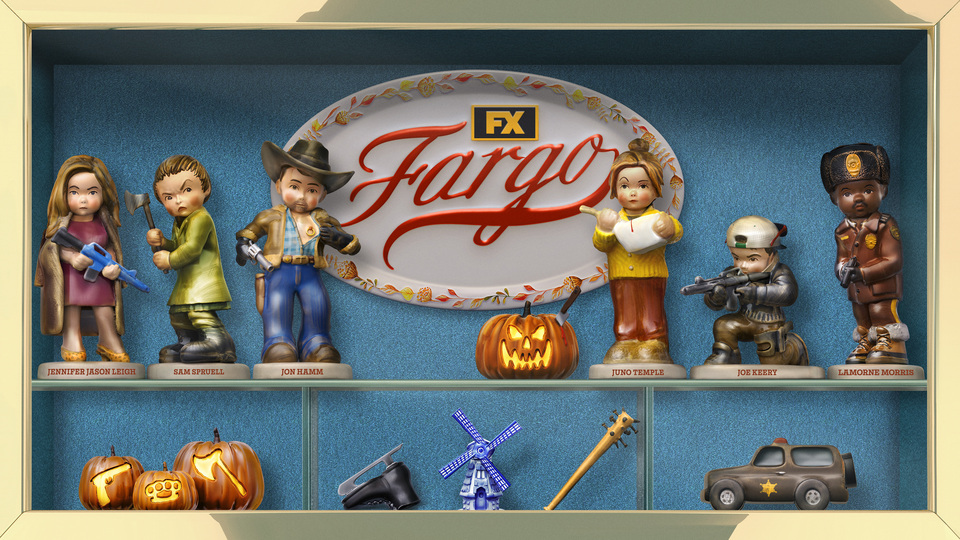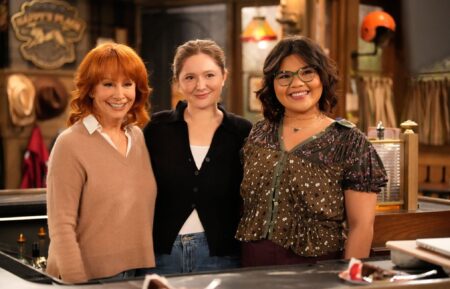‘Fargo’ Season 3 Premiere: ‘The Law of Vacant Places’ (RECAP)

Spoiler Alert
The third variation on Noah Hawley’s Fargo theme—aside from its East Berlin interrogation room-set intro—begins by placing its performers on the stage and sampling their tones in little vignettes. Each of Fargo’s first two seasons has rewritten a pre-existing score of “Minnesota nice” schmucks and crooks, and Season 3 follows suit, playing with an ensemble of familiar characters while introducing enough variation to make for a distinct composition.
The cryptic 1988 German opening pits the ideas of “truth” and “story” against each other in a way that’s reminiscent of, if significantly grimmer than, the alien spacecraft thread from Season 2. Hawley, and the Coen Brothers, have a knack for producing fiction about truth that’s stranger than fiction, exaggerating real-world situations in unsettlingly plausible ways.
In Fargo’s Season 3 cold open, a powerless man is forced to accept a manufactured “truth” instead of an authentic “story,” calling into question the meaning of either term just before the standard “This is a true story” disclaimer arrives and time jumps to the main plotline, set in 2010.
This time around, the part of bumbling, semi-accidental criminal—embodied in previous Fargo iterations by William H. Macy, Martin Freeman and Jesse Plemons—is shared by two brothers, both played by Ewan McGregor. Brother number 1, Emmit Stussy, is introduced sporting a white tux and holding court in his palatial home, while obviously less successful brother number 2, Ray, spitefully looks on.
Ray, a parole officer accompanied by his drop-dead gorgeous but classless parolee girlfriend, Nikki, requests a meeting with Emmit to ask for money to buy an engagement ring. Citing an inheritance deal in which Ray ended up with a car and Emmit made off with a collection of extremely valuable vintage stamps, Ray claims that Emmit owes him. Emmit and his mustachioed money man Sy disagree.

(L-R): Michael Stuhlbarg as Sy Feltz and Ewan McGregor as Emmit Stussy (Chris Large/FX)
Ray doesn’t get any money out of his brother, but Nikki doesn’t seem to take the news too hard. If Kirsten Dunst’s Peggy was partially a victim in Season 2, trapped in a patriarchal society and forced by years of repression to self-destructively grasp at “self-actualization,” Mary Elizabeth Winstead’s Nikki is being set up as her dark reflection: a patriarchal nightmare who uses her feminine wiles to seduce incompetent male power structures and advance her personal interests. She could be a Lady Macbeth stand-in if Ray had any sort of ambition, royal or otherwise. But the only royalty in the Stussy family is Emmit, the Parking Lot King of Minnesota.
Nikki could easily have been reduced to a dissonant wad of male fears about attractive women, but Fargo is a smart enough show that no character’s personality is left on a single note. Yes, she’s trashy and demanding, and she’s probably using Ray to skip out on her parole and to get access to Emmit’s fortune, but something in Winstead’s performance during her “sympatico” speech gives off the impression that there is some genuine affection to her character beyond simple gold-digging.
Next introduced, as the old-fashioned, generally well-meaning police officer along the lines of Frances McDormand, Allison Tolman and Patrick Wilson’s previous Fargo characters, there’s Carrie Coon’s Gloria Burgle. A bit more world-weary than previous versions of her character, Gloria is almost a new melody in Fargo’s tune, but she settles into easy harmony with the larger Coen Brothers repertoire. Imagine Marge Gunderson’s polite candor and determination crossed with the wistfulness in the face of a changing world expressed by Tommy Lee Jones’s cop in No Country for Old Men (another Coen adaptation that tears the scab of superficial nicety from the scrape of modern American aggression).
Gloria comes packaged with school-aged son Nathan, cantankerous step-father Ennis Stussy—who hides his love for his step-grandson under a thick coat of Midwest stoicism and liquor—and an ex-husband who’s left her for another man.
Once all these most prominent players have been introduced, the framework of the season’s interaction between them begins to crystallize. Ray, fed up with being urinated on by convicts, decides to recruit a lapsed parolee to rob Emmit of his last vintage stamp. Maurice, the drunk, stoned parolee, turns out to be less than 100 percent reliable (go figure), losing Emmit’s address, and instead finding himself in the home of Ennis Stussy, Gloria’s stepfather. When Gloria comes by the house to pick up a gift Ennis had made for Nathan, she finds the old man dead, and as chief of police, she takes it on herself to clear the building and begin an investigation.
This whole stamp theft caper culminates in the season’s second murder. Things sour quickly when Maurice returns to Emmit and Nikki with a sheet of regular old postage stamps. After pulling a gun on Ray and demanding $5,000 for his botched job, Maurice leaves Nikki’s apartment, but Nikki leaps into action, loosening her window A/C unit to strike the mandatory Fargo premiere chord of abrupt, borderline slapstick violence. Before he can finish his cigarette, Maurice is pancaked by the projectile appliance.
RELATED: Sign Up For TV Insider’s Fargo Newsletter
Meanwhile, Emmit finds himself menaced by the shady investor who, one year prior, had offered the capital to save his company when no one else would. V.M. Varga, played with charismatic detachment by Harry Potter’s David Thewlis, lays out for Emmit just how unintentionally deep he’s in with whatever organized crime organization the Narwhal investment firm fronts.
With Emmit an unwilling pawn of organized crime, Ray involved in two murders and Gloria beginning to piece together the evidence that will bring all these stories together, all of Fargo’s necessary instruments seem to be in working order. The rest of the season will determine the specific notes of a dizzying bolero of pleasant Midwest overtones atop the busy noodling of intricate, often incompetent, people.
Fargo Season 3, Wednesdays, 10/9c, FX









